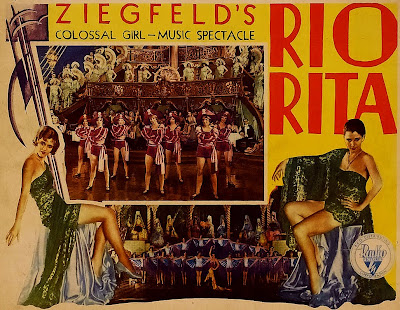
The first life of the Hollywood movie musical ended in the summer of 1930. The movie goers were fed up with backstage dramas and movies built around a generous bouquet of songs. The songs could be great but plots were often thin and it was hard to tell the difference between two films. The studios were taken by surprise by this sudden change in behaviour. They were convinced they had found the ultimate form of entertainment. Something quickly had to change, it was inevitable. The musicals that were already made waiting for release were put on hold, in hope the reluctancy towards musical films would wear off. Many of the musicals in pre-production, or projects that were planned for the 1930-31 season were canceled. The most ill fated and expensive of the aborted projects was of course MGM's The March Of Time which has a post of it's own.
Some studios, most notably Warner Bros, came up with a third solution: They simply cut out as many songs as possible turning a would be musical into a comedy. Sometimes it almost worked, mostly it didn't. This is the reason many movies of this period are very short. If a 1930 movie end up with a running time of something between 60 or 70 minutes one can be quite sure there were cuts, most certainly songs.
This was the case with First National/Warner's Top Speed that opened almost songless late August 1930. Joe E. Brown and Jack Whiting play two clerks who poses as rich playboys at a swanky summer resort. (The movie was shot almost entirely at the Norconian Resort). One of them falls in love with a millionaire's daughter who has a very disapproving father, until he wins, through fate and fortune, the Big Boat Race, in the vessel owned by his sweetheart's father.

The Norconian Resort in Top Speed 1930
Bernice is just going to sing a fine song to her beau Jack Whiting, "As Long as I Have You and You Have Me". The music cue fades up, but just as she is about to open her mouth... Cut!
Earlier blockbusters were also tampered with at this time. Rio Rita, the big Christmas success of 1929 was re-released in 1932 in what was called a "modernized version". The modernization consisted of cut musical numbers. Rio Rita was a mammoth picture running in "massive 14 reels" which means that it had a running time of about 140 minutes. With the coming of the talkies a standard running time of 8-10 reels was quickly established. The silent movies had often been much more extravagant and extreme running times were common during the silent era. Rio Rita was one of those really extravagant movie operettas with the distinction it also was hugely successful. The earliest talkies aged very quickly, Rio Rita was no exeption. With it's rather slow pace, it had in many ways the form of a silent movie. To make this giant work wonders again something had to be done.

The missing pirate girls in the 1932 version of Rio Rita
It's been said that the cuts to Rio Rita which formed the 1932 re-release version were done by the hand of none other than David O. Selznick, but whether true or not, the fact remains that the film was slashed by somewhere between four and five reels in length, amounting to at least 40 minutes of deletions. The Rio Rita seen today is thus about two thirds of what it once was. Let's examine what we have and see if we can find any obvious cuts:
Just as the color portion begins we find one of the ugliest cuts. The anonymous singer has just finished crooning when we can see an acrobat act entering the stage. We also see a mass of chorus girls towering at the back of the stage. Cut!
Luckily most of the soundtrack to the 1929 version has survived. It's in terrible shape, but after some heavy filtering the truth emerges, the missing two and half minutes are there:
Another cut in Rio Rita is a giant production number of Sweetheart We Need Each Other. Look first at the 1932 version, just after the risque hint of male kissing both couples fall overboard... Cut!:
Then listen to what is happening on the 1929 soundtrack:
I'm positive I'm not the only one who would like to see that number.
Let's hope that 1929 original version of Rio Rita resurface some day soon. My firm belief is that it has just been replaced or mislabled, sitting on a shelf in an institution somewhere. The latest public showing of the original Rio Rita I have heard about took place around 1980.
Let's end this post with one of the three songs from Top Speed that was considered too good to cut. Laura Lee and Joe E. Brown perform Knock Knees by Al Dubin and Joseph Burke. The dance director is of course Larry Ceballos.




